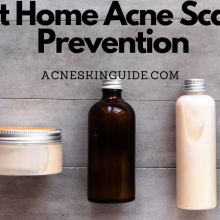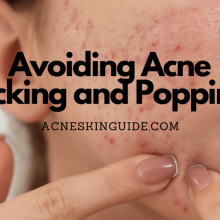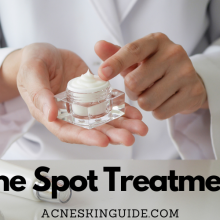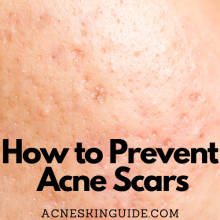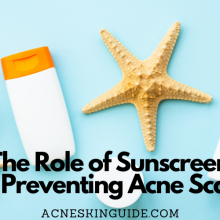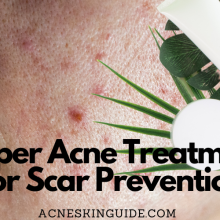Early Treatment for Acne | Acne Skin Guide
Acne can lead to permanent scarring if left untreated, impacting not just physical appearance but also self-esteem. However, by prioritizing early intervention and taking a comprehensive approach to acne management, individuals can significantly reduce their risk of developing acne scars. Understanding how acne lesions form and the factors that contribute to scarring is key. A multi-pronged strategy involving gentle skincare routines, over-the-counter and prescription treatments, professional procedures like chemical peels and laser therapy, as well as complementary therapies can effectively target acne.
Preventive measures like avoiding pimple picking, using sunscreen, and being consistent with treatments are also crucial. While some professional treatments may have downsides like costs and potential side effects, the benefits of scar prevention make early, proactive acne care worthwhile for preserving smooth, clear skin and boosting overall confidence.
#1 Recommended Acne Treatment | #2 Recommended Acne Treatment |
 |  |

Acne: The Unseen Battle Beneath the Skin
Acne is often dismissed as a mere inconvenience of adolescence, but for many, it’s a chronic condition with lasting consequences. While the pimples, blackheads, and whiteheads are frustrating enough, the real battle lies in preventing the permanent scarring that can result from severe or untreated acne. Fortunately, by taking a proactive and comprehensive approach to acne management, it’s possible to significantly reduce the risk of developing acne scars, preserving both physical and emotional well-being.
Understanding Acne and Scar Formation
Acne occurs when hair follicles become clogged with excess oil, dead skin cells, and bacteria, leading to inflammation and the formation of pimples, blackheads, and whiteheads. While these lesions may seem superficial, the root cause lies much deeper. Factors like hormonal imbalances, genetics, and stress can all contribute to the overproduction of sebum (oil) and the proliferation of acne-causing bacteria.
When acne lesions rupture or are picked at, the skin’s natural repair process can result in scarring. The inflammation and trauma caused by the acne lesions trigger the formation of new collagen fibers, which can create depressed (atrophic) or raised (hypertrophic) scars. The severity and extent of scarring depend on factors like skin type, genetics, and the intensity of the acne.
The Benefits of Early Intervention
Seeking early treatment for acne is crucial for preventing it from progressing and causing more severe inflammation and damage to the skin. By addressing acne promptly, you can minimize the severity of lesions and reduce the risk of scarring. This proactive approach not only improves physical appearance but also boosts self-confidence and emotional well-being, which can be severely impacted by acne and its aftermath.
Additionally, early intervention can save money in the long run by avoiding costly scar treatment procedures, which can be both expensive and time-consuming. It’s far more effective and cost-efficient to prevent scars from forming in the first place.
Scar-Free Acne Management Strategies
A comprehensive acne management plan involves a multifaceted approach, combining proactive skincare routines, topical treatments, and professional interventions when necessary.
- Proactive Skincare Routine: Gentle cleansing, moisturizing, and sun protection are essential for maintaining healthy skin and minimizing irritation.
- Over-the-Counter Topical Treatments: Benzoyl peroxide and salicylic acid are effective over-the-counter options for treating mild to moderate acne.
- Prescription Medications: For more severe or persistent acne, prescription medications like retinoids (e.g., Accutane) and antibiotics may be necessary.
- Professional Treatments: Dermatologists can offer various professional treatments, such as chemical peels, laser therapy, and other light-based therapies, to target stubborn acne and prevent scarring.
- Complementary Therapies: Diet modifications, stress management, and certain supplements may also support acne treatment by addressing underlying imbalances.
Acne Scar Prevention Tips
In addition to seeking professional treatment, there are several preventive measures individuals can take to minimize the risk of acne scarring:
- Avoid picking or squeezing pimples, as this can lead to further inflammation and damage.
- Keep the skin hydrated and moisturized to support healing.
- Use sunscreen to protect existing acne lesions from UV damage, which can worsen scarring.
- Practice proper cleansing and exfoliation techniques to remove excess oil and dead skin cells without causing irritation.
- Be patient and consistent with treatments, as acne management often requires time and perseverance.
Targeted Solutions for Different Age Groups
Acne affects individuals of all ages, with unique considerations for each life stage. Teenagers may require strategies to manage hormonal acne, while adult women often experience acne flare-ups due to fluctuating hormones and other factors like stress and cosmetic products. People of color may also have different concerns related to acne scarring and discoloration, requiring tailored approaches.
Ongoing Scar Treatment and Management
For individuals who already have acne scars, there are various treatment options available, including resurfacing procedures like chemical peels, laser treatments, and microneedling, as well as dermal fillers for depressed scars. These scar treatments can be combined with ongoing acne management to address both active acne and previous scarring.
It’s important to have realistic expectations and understand that scar improvement may take time and multiple treatment sessions. Additionally, some scar treatments may have potential side effects, such as skin irritation, redness, and temporary discoloration, which should be discussed with a qualified dermatologist.
Potential Downsides and Considerations
While early and proactive acne treatment is highly recommended for preventing scarring, it’s important to be aware of potential downsides and considerations:
- Overuse or misuse of certain acne treatments, particularly prescription medications, can lead to side effects like skin dryness, irritation, and increased sun sensitivity.
- Some acne treatments, such as isotretinoin (Accutane), can have more severe side effects and require close monitoring by a dermatologist.
- Professional treatments like chemical peels and laser therapy can be costly and may not be covered by insurance.
- Individuals with sensitive skin or certain skin conditions may need to be more cautious with certain acne treatments or seek specialized advice.
- Consistency and patience are essential, as acne management is often a long-term process, and results may not be immediate.
Conclusion
Early and proactive acne treatment is crucial for preventing the formation of permanent scars and preserving both physical and emotional well-being. By understanding the causes and risk factors of acne scarring, implementing a comprehensive acne management strategy, and seeking professional help when needed, individuals can significantly reduce their chances of developing acne scars.
Resources like qualified dermatologists and estheticians can provide guidance and support throughout the process, tailoring treatments to individual needs and addressing any misconceptions or stigmas surrounding acne. With the right approach and commitment, it’s possible to achieve clear, scar-free skin and boost overall confidence and self-esteem.
#1 Recommended Acne Treatment | #2 Recommended Acne Treatment |
 |  |
Summary and FAQs
What are the early signs of acne that indicate the need for prompt treatment?
The early signs of acne that indicate the need for prompt treatment include:
- Whiteheads and blackheads: These are the initial stages of acne, where hair follicles become clogged with oil and dead skin cells, forming small white or black bumps on the skin.
- Papules: Papules are small, red, inflamed bumps that are solid and slightly raised. They are an early sign that acne is progressing and may lead to more severe lesions if left untreated.
- Pustules: Pustules are red pimples with a white or yellow center filled with pus. These are a more severe form of acne and can lead to scarring if not treated promptly.
- Cystic lesions: Cystic acne lesions are large, painful, and inflamed pimples that extend deep into the skin. They are likely to cause scarring if not treated properly and promptly.
- Acne in new areas: If you start developing acne in areas where you typically don’t experience breakouts, such as the back, chest, or shoulders, it could be a sign of more severe acne that requires treatment.
If you notice any of these early signs, it’s important to seek treatment from a dermatologist or skincare professional to prevent the acne from worsening and potentially causing scarring.
How soon after the first acne lesions appear should treatment be sought to effectively prevent scarring?
It’s generally recommended to seek treatment as soon as possible after the first acne lesions appear to effectively prevent scarring. Here are some guidelines:
- At the first sign of inflammatory acne: If you start developing papules (red, inflamed bumps), pustules (pimples with pus), or cystic lesions, it’s advisable to seek treatment within a few weeks. These inflammatory acne lesions are more likely to cause scarring if left untreated.
- Within 2-4 weeks of persistent non-inflammatory acne: If you have persistent whiteheads, blackheads, or mild non-inflammatory acne that doesn’t improve with over-the-counter treatments after 2-4 weeks, it’s a good idea to consult a dermatologist. Prompt treatment can prevent these lesions from progressing to more severe forms of acne that increase scarring risk.
- Immediately for cystic or severe acne: If you develop cystic acne, which are large, painful, inflamed lesions deep within the skin, it’s crucial to seek professional treatment immediately. Cystic acne is more likely to cause permanent scarring if not treated promptly and properly.
The sooner you start treatment, the better the chances of preventing acne from worsening and causing scarring. Early intervention helps control inflammation, prevent lesions from rupturing, and minimize damage to the skin’s structure.
It’s also important to note that some individuals may be more prone to scarring due to genetics or skin type, so seeking professional guidance early on can help identify appropriate preventative measures.
Are there any specific dietary or lifestyle changes recommended for early acne management and scar prevention?
Yes, there are several dietary and lifestyle changes that can help with early acne management and scar prevention:
Dietary Recommendations:
- Limit dairy products: Some studies suggest that dairy, particularly skim milk and whey protein, may contribute to acne by increasing insulin and IGF-1 levels, which can stimulate oil production and inflammation.
- Increase intake of antioxidants: Consuming more fruits and vegetables rich in antioxidants like vitamins A, C, and E, as well as zinc, can help reduce inflammation and support skin health.
- Reduce sugar and high-glycemic foods: Excessive consumption of sugary foods and refined carbohydrates can contribute to hormonal fluctuations and inflammation, potentially exacerbating acne.
- Stay hydrated: Drinking plenty of water can help flush out toxins and promote overall skin health.
Lifestyle Changes:
- Manage stress: Stress can trigger hormonal imbalances and inflammation, both of which can worsen acne. Practicing stress-reduction techniques like meditation, yoga, or exercise can be beneficial.
- Get enough sleep: Adequate sleep is essential for overall health, including skin health. Lack of sleep can disrupt hormone levels and contribute to inflammation.
- Exercise regularly: Regular physical activity can help regulate hormones, reduce stress, and promote better circulation, all of which can support skin health and acne management.
- Avoid harsh skincare products: Using gentle, non-comedogenic (non-pore-clogging) skincare products can prevent further irritation and inflammation.
- Don’t pick or squeeze pimples: Picking or squeezing acne lesions can lead to scarring and worsen the condition.
It’s important to note that dietary and lifestyle changes alone may not be sufficient for managing severe or persistent acne, and professional medical treatment may still be necessary. However, incorporating these changes can complement other acne treatments and support overall skin health, potentially reducing the risk of scarring.
What are the most effective early acne treatments for different skin types and ethnicities?
The most effective early acne treatments can vary depending on skin type and ethnicity. Here are some recommendations:
- Oily Skin:
- Salicylic acid-based products can help unclog pores and control excess oil production.
- Benzoyl peroxide is effective for killing acne-causing bacteria and drying out pimples.
- Retinoids (like adapalene or tretinoin) can prevent new breakouts by promoting cell turnover.
- Dry or Sensitive Skin:
- Gentle, non-irritating cleansers and moisturizers are recommended to avoid further drying out the skin.
- Low concentrations of benzoyl peroxide (2.5% or less) can be used to minimize irritation.
- Topical antibiotics (like clindamycin) may be prescribed to reduce inflammation without overly drying the skin.
- Combination Skin:
- A combination of treatments targeting oily and dry areas may be necessary.
- Spot treatments with benzoyl peroxide or salicylic acid can be used on oily areas, while gentler products are used on dry patches.
- People with Darker Skin Tones (African, Asian, Hispanic, etc.):
- Retinoids and azelaic acid are often preferred as they are less likely to cause post-inflammatory hyperpigmentation (dark spots).
- Hydroquinone-based products may be recommended to help fade existing dark spots from previous acne.
- Chemical peels and laser treatments should be approached cautiously to avoid scarring or discoloration.
- Fair Skin Types:
- Retinoids and benzoyl peroxide can be effective but may increase sun sensitivity, so sunscreen use is crucial.
- Salicylic acid peels or lasers may be used for more severe cases but with caution to avoid irritation or post-inflammatory hyperpigmentation.
It’s important to work closely with a dermatologist to determine the most appropriate early acne treatment based on individual skin type, ethnicity, and acne severity. A customized approach that considers these factors can help maximize effectiveness and minimize potential side effects or complications.
Are there any preventative measures or treatments suitable for individuals prone to acne before breakouts occur?
Yes, there are preventative measures and treatments that can be beneficial for individuals who are prone to acne, even before breakouts occur:
- Topical Retinoids: Retinoids like adapalene, tretinoin, or tazarotene can be used as a preventative measure. They work by unclogging pores, regulating cell turnover, and reducing inflammation. Starting a retinoid before breakouts can help prevent acne from forming.
- Salicylic Acid: Using salicylic acid-based cleansers or spot treatments can help keep pores clear and prevent buildup of oil and dead skin cells that can lead to acne.
- Benzoyl Peroxide: Low concentrations of benzoyl peroxide (2.5% or less) can be used as a preventative measure for its antibacterial properties, helping to control the growth of acne-causing bacteria.
- Birth Control Pills: For women prone to hormonal acne, birth control pills containing estrogen and progestin can help regulate hormones and prevent breakouts.
- Spironolactone: This medication is sometimes prescribed off-label for its anti-androgenic effects, which can help prevent hormonal acne in women.
- Dietary Changes: Following a low-glycemic diet, reducing dairy intake, and increasing consumption of antioxidants and omega-3s may help prevent acne flare-ups.
- Stress Management: Stress can trigger acne, so practicing stress-reducing techniques like meditation, yoga, or exercise can be preventative.
- Professional Treatments: Individuals with a history of severe acne or a high risk of scarring may benefit from preventative professional treatments like chemical peels or photodynamic therapy.
It’s important to consult with a dermatologist to determine the most appropriate preventative measures based on individual risk factors, skin type, and medical history. Early intervention and consistent use of preventative treatments can help minimize the frequency and severity of acne breakouts.

